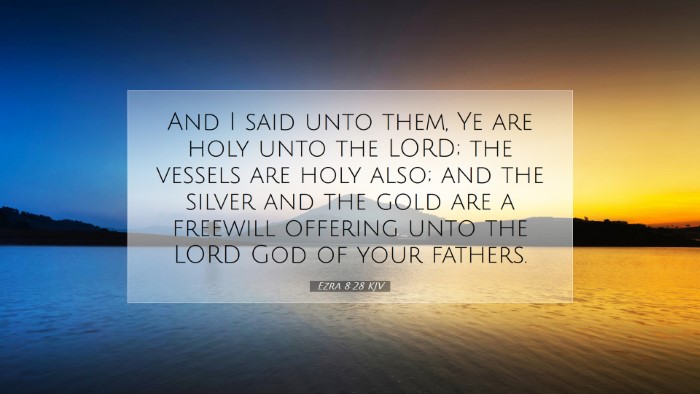Commentary on Ezra 8:28
Ezra 8:28 states: "And I said unto them, Ye are holy unto the LORD; the vessels are holy also: and the silver and the gold are a freewill offering unto the LORD God of your fathers." This verse reflects a profound moment in the journey of Ezra and the returning exiles as they prepare to contribute to the restoration of the Temple in Jerusalem.
Contextual Significance
The contextual backdrop of Ezra 8 reveals the return of the people of God from Babylonian captivity. Ezra is not only a scribe and priest but also a leader committed to restoring both the worship of God and the spiritual integrity of the people. After a lengthy journey laden with peril, Ezra emphasizes the sanctity of their mission and the offerings they bear.
Ezra’s Charge to the Levites
In this verse, Ezra addresses the Levites who accompany him, acknowledging their role in the holy mission they embark upon. It reflects the recognition of their sacred calling:
- Holiness of the People: Ezra asserts that the Levites are "holy unto the LORD," which underscores the importance of their spiritual disposition as they handle sacred items.
- Holiness of the Vessels: This signifies that the vessels themselves, which were designated for the use in Temple worship, are set apart for divine service.
The Concept of Freewill Offerings
The mention of "the silver and the gold" as a freewill offering carries significant theological implications:
- Voluntary Giving: It emphasizes the necessity of voluntary contributions to the work of the LORD, indicating that such offerings stem from a willing heart, not compulsion.
- Restoration and Dedication: The use of silver and gold is indicative of restoration, as these were essential to reconstructing the Temple and reviving true worship in Israel.
The Theological Implications
This verse invites deeper reflection on the relationship between the sacred and the secular. Matthew Henry comments on the idea that to serve in the house of God is to be engaged in a function of utmost holiness. He articulates that those who serve must comprehend that their offerings—and indeed their entire lives—are to be seen through the prism of holiness.
Application for Contemporary Believers
For modern-day believers, the principles embedded in Ezra 8:28 remain relevant:
- Recognizing Our Holiness: Just as Ezra confers holiness upon the Levites, believers today are called to understand their identity as holy before God, equipped to serve Him with reverence.
- The Importance of Intentional Giving: Offering up resources to the service of God is still a guiding principle. Churches and ministries thrive on the generosity marked by freewill offerings—enabled by a heart that desires to support God’s work.
- Consecration of Resources: Just as the wealth of Israel is consecrated for the temple, believers are encouraged to view their material possessions as tools for the Kingdom’s advancement.
Insights from Albert Barnes
Albert Barnes brings attention to the practicality involved in serving God. He notes that Ezra’s instructions were not mere theological musings; they had direct implications for the Levitical roles and the logistics of temple worship. The holiness of the vessels corresponds with the Levites’ dedication, creating a holistic environment where both people and possessions are aligned with divine purposes.
Convergence of Theological Perspectives
Adam Clarke emphasizes the necessity of purity in worship. The commitment to holiness is paramount in maintaining a holy atmosphere conducive to God's presence among His people. This verse serves as a reminder that, when engaging in the work of the Lord, every participant must acknowledge their unique calling and the gravity of their contributions.
Conclusion
Ezra 8:28 encapsulates the essence of what it means to be set apart for God’s service. It challenges both leaders and laypeople alike to view their participation in sacred endeavors as a high calling. As we examine this passage, may we be inspired to pursue holiness in our own lives and be generous in our offerings to the work of God, reflecting the principles delineated by Ezra in his time.
In summary, this verse stands as a powerful reminder of our identity as God's chosen people and our duty to approach His work with gravity, joy, and a willingness to give selflessly.


